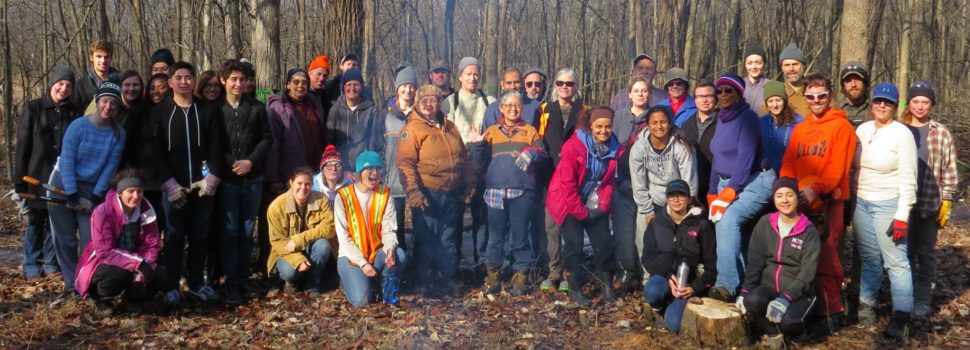Volunteering for Ecological Restoration
What to expect
What you will do:
Depending on the season and site conditions, specific activities will vary. Brush cutting, weeding, seed collecting, and litter clean-up are the most common stewardship activities.
Where to go:
A meeting location will be listed on the registration page and a leader will be there to direct the group. The leader(s) will provide instructions for the activity and help guide you throughout the day.
What you should bring and wear:
Please bring your own reusable water bottle. Some volunteers like to bring snacks to share with the group. Wear full-coverage clothing and shoes that will protect against mud, mosquitoes, poison ivy, snow, rain, etc. Expect to get dirty. Tools, work gloves and water refills will be provided.
If you plan to bring children:
All ages are welcome. Please check with the site leader if you have very young children, to confirm that the planned activity and location is safe for them. All children younger than 18 years old must be accompanied by a caretaker at all times.
FAQ
Do I need to register in order to volunteer?
Though not mandatory, registering allows leaders to contact you in case of cancellation, and generally helps them plan for the day. Creating a profile at FPDCC.com allows you to log your hours so that you can earn special volunteer rewards, sign up for training classes, and demonstrate to the world how many people in Cook County love and care for nature.
Do I need experience?
All levels of experience are welcome – from first timers to seasoned experts.
Can I bring a group?
Please contact the site leader to arrange for groups of 6 or more people. Click here to learn more about Friends’ Corporate Team Building Day program.
What is habitat restoration/ecological stewardship?
The Forest Preserves of Cook County covers approximately 70,000 acres in Cook County. While the preserves are home to an incredible diversity of plants and animals, the health of these public lands is facing threats such as invasive plants, erosion and pollution. The good news is that every weekend, in all parts of the county, teams of dedicated volunteers are out solving these problems through ecological stewardship activities such as removing invasive plants, collecting and spreading native plant seeds, picking up litter and more.
What if I’m not ready to volunteer, but still curious about the preserves?
You’re not alone! Get comfortable in the preserves by attending an event with Friends or exploring the many educational and recreational opportunities offered by the Forest Preserves of Cook County. Visit a nature center, take a walk, ride your bike, or attend a class or guided tour.
What is Centennial Volunteers?
Centennial Volunteers is a movement toward forest and river revitalization along the North Branch and Calumet Rivers. With guidance from Friends staff and volunteer leaders, new volunteers learn what it takes to restore the diversity of life at specific forest preserves sites. Our goal is to grow a community of people who will become caretakers and stewards through on-going education and training.
Centennial Volunteers is a collaborative program led by Friends of the Forest Preserves, the Forest Preserves of Cook County, Friends of the Chicago River, and The Field Museum, and generously supported by the National Fish and Wildlife Foundation.
How can I learn more about the plants, animals, and ecosystems in the preserves?
Free classes are available to help you expand your knowledge on topics such as plant id, managing invasive species, bird identification, and ecosystem ecology. Attending these classes is a great way to deepen your experience and impact in the field. Contact us to learn more.
What is the path to stewardship/how do I earn special skill certifications and join a volunteer leadership team?
The Forest Preserves of Cook County’s Path to Stewardship is open to any volunteer wanting to increase their dedication to restoring the forest preserves to ecological health. Field experience, classes and mentors give you the qualifications you need to become certified in special skills. Certification opportunities include: Site Steward, Apprentice Steward, Volunteer Workday Leader, Brush Pile Burn Boss, Herbicide Applicator/Operator, and Chainsawyer/Feller.
Volunteer leadership teams also require many additional skills that don’t require certification! The best way to find out about joining a volunteer team is to talk with the leaders at a volunteer workday, or contact us.

